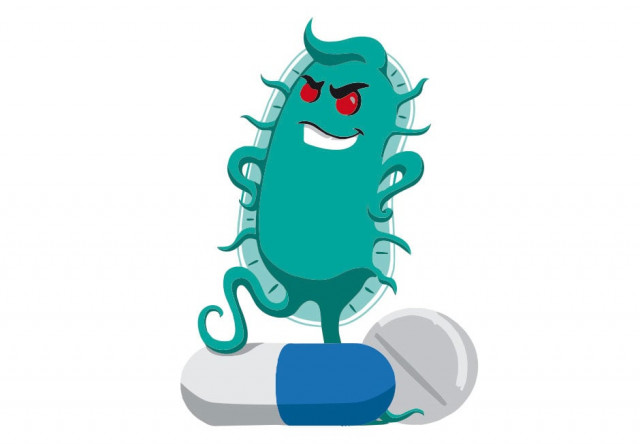Pakistan’s risky affair with antibiotics
As new strains of drug-resistant bacteria evolve

DESIGN: YAYHA IBRAHIM/EXPRESS
Only a few, however, realise the grave risk their self-medication habit poses. As newer strains of drug resistant bacteria take up arms against the human body, there remains little in the medical artillery to combat these emerging threats. Uncontrolled use of antibiotics has led to the emergence of a new generation of microorganisms impervious to the drugs.
Labs declare 92 brands of medicines spurious
According to Liaquat National Hospital MD Dr Salman Fareedi, The International Institute of Health has compiled a list of anti-microbial resistant bacteria which pose the most threat to human health. On top of the list of viruses is E.coli, a rod-shaped, coli-form bacterium responsible for causing Pneumonia. Typhoid too, proves to be resistant to the potency of the medicine and patients have to be administered two different antibiotics at the same time for any chance of being cured.
“Considering the extent of the threat, there is the need to develop medicines keeping in mind the resistance to current medications,” said Dr Fareedi. “In the case of Pakistan, where the use of antibiotics has increased by 40 per cent, medical professionals should take extreme care when recommending antibiotics to patients and refrain from prescribing unnecessarily.”
More than 700,000 people all over the world are estimated to lose their lives to antimicrobial resistant microorganisms every year, according to reports. The International Institute of Health, stressing on the gravity of the matter, recommends that antimicrobial medicines should not be sold without the prescription of a qualified doctor. However, antibiotic medicines tend to be largely sold as over-the-counter drugs in developing countries like Pakistan, India and Afghanistan.
This promotes a culture of self-medication, where patients resort to using antibiotics for illnesses like common flu, cough or fever and quit as soon as they experience any betterment in their condition. They then go on to further recommend the same antibiotics to everyone else. But where one antibiotic may work for a certain patient, it may not do the same for everyone else, say medical experts. In most cases, the fever, cough or cold subsides on its own, but the unnecessary use of antibiotics gives rise to drug resistant strains of microorganisms, which may have come in contact of the medication.
“This is the reason bacterial infections which were easily treatable a few years back can now no longer be treated with antibiotics. These infections require Second Line Drugs like Levofloxacin or Moxifloxacin, which are very expensive to acquire,” said Dr Fareedi. “Hence a disease which once required a few hundred rupees, now incurs many thousands of rupees for treatment, putting medical healthcare further beyond the reach of the poor.”
Senate panel calls for drug testing lab
A report published in a Pakistani research journal has stressed the need to devise a national action plan to curb the misuse of antibiotics and other medicines. According to experts, there are more than 50,000 unnecessarily registered medicines in Pakistan. The number of quack doctors, meanwhile, is estimated to be more than 600,000. As a result, the country boasts some of the highest levels of self-medication and antibiotic use.
“Although, antibiotics are considered revolutionary in the medical world but their unnecessary use is giving rise to diseases which are beyond man’s control,” stressed Dr Fareedi. “If left to fare the way they are, the growing number of antimicrobial resistant strains is a ticking time-bomb of a nationwide proportions,” he added.



















COMMENTS
Comments are moderated and generally will be posted if they are on-topic and not abusive.
For more information, please see our Comments FAQ